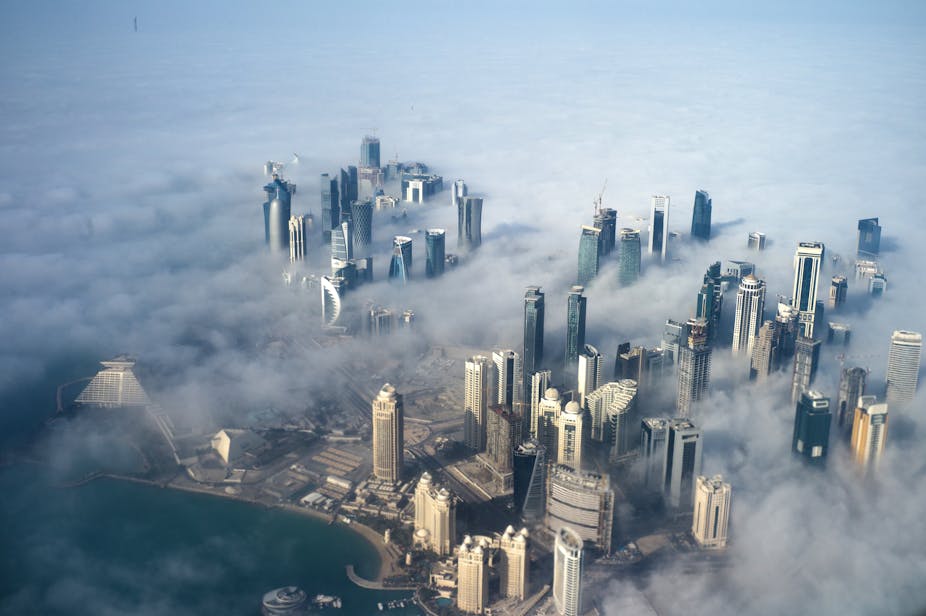Qatar, a small Gulf state with the largest GDP per capita in the world and host of the 2022 World Cup, is suddenly at the heart of a diplomatic spat that is threatening stability in the region.
On the morning of June 5, Bahrain, Saudi Arabia, the UAE and Egypt all withdrew their ambassadors from Qatar, giving them 48 hours to leave and giving Qatari citizens 14 days to return home. They did this after the Emir of Qatar, Sheikh Tamim, was alleged to have stated that “Iran represents a regional and Islamic power that cannot be ignored, and it is unwise to face up against it”. He also supposedly called for a de-escalation in tensions with Hezbollah and allegedly referred to Hamas as “the legitimate representative of the Palestinian people”.
These comments were at first reported by official Qatari media outlets, but then taken down; Doha dismissed them as “fake news” and claimed that its news agency had been hacked to post them.
Since then, the Qatari-owned Al Jazeera news service has been blocked in Saudi Arabia and the UAE, and the Gulf states have been vocal in their criticism of Qatar, castigating it as a “disobedient son”.
Relations between Qatar and the other members of the Gulf Co-Operation Council have been tense for some time. So why have things suddenly escalated now?
At the heart of it all are two main issues that Saudi Arabia, the UAE and Bahrain view as existential threats: Qatar’s support for Islamist groups across the Middle East, notably the Muslim Brotherhood and Hamas, and its relationship with Iran, which is far more nuanced than Saudi Arabia’s. The Saudi line on terrorism in the region is generally to blame Iran, with other members of the GCC expected to follow suit. Sheikh Tamim’s alleged comments implied that Qatar is going its own way.
The UAE’s Ministry of Foreign Affairs had this to say:
The UAE is taking these decisive measures as a result of the Qatari authorities’ … continued support, funding and hosting of terror groups, primarily Islamic Brotherhood, and its sustained endeavours to promote the ideologies of [the so-called Islamic State] and al-Qaeda across its direct and indirect media … The UAE measures are taken as well based on Qatari authorities’ hosting of terrorist elements and meddling in the affairs of other countries as well as their support of terror groups – policies which are likely to push the region into a stage of unpredictable consequences.
But however sudden the current crisis seems, the rift it reveals has been there for some time.
Qatar poses a challenge to Saudi hegemony across the Middle East. It has made independent contributions to the conflicts in Syria, Yemen, and is trying to increase its soft power. Whether by making Al Jazeera a global brand or hosting the 2022 World Cup and other prominent sporting events, Qatar is working hard to establish itself on the world stage – and moving away from Saudi foreign policy is a key part of this strategy.
The double game
Whether real or “fake”, Sheikh Tamim’s reported words were clearly interpreted as part of a pattern of behaviour intended to loosen the Saudis’ strategic grip. The message would seem to be that Doha’s foreign policy is very much its own, marked by a nuanced relationship with Iran and dealings with both the Muslim Brotherhood and Hamas.
Both these groups challenge the political status quo across the region, which naturally worries Saudi Arabia in particular. Tensions last flared up over this in 2014, when several countries withdrew their ambassadors from Doha in protest at its support for “destabilising” groups. That row was resolved, and since then, Qatar has largely toed the Saudi line – but it remains less than willing to turn its back on all of its Islamist friends, whatever the diplomatic implications.

As things stand, Doha is left with two clear choices. On the one hand, it could simply bow to Saudi and Emirati pressure once again; on the other, it could continue to chart its own course independent of the other GCC countries, moving closer to Iran and keeping up its support for Islamists. This, of course, will only stoke tensions with other states beyond the GCC, including the US.
Perhaps Qatar will try to have it both ways; after all, it already simultaneously hosts the US (at a military base at al-Udeid) and Hamas’s leader, longtime Doha resident Khalid Meshaal. But any sort of double game may prove unwinnable given its Gulf neighbours’ demands.
Not least among these is their call for the wholesale closure of Al Jazeera, which provides a critical voice in a region where media dissent is scarce. Given its editorial line generally meshes with Doha’s foreign policy aims, its closure would be a serious blow to Qatari influence around the world.
We are now witnessing a game of high stakes poker between increasingly influential actors and perhaps we should view recent events as both Washington and Riyadh saying enough is enough.

